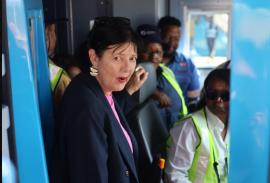
Transport Minister Barbara Creecy says State-owned Enterprises (SOEs) have a critical role to play in providing economic opportunities to young people, which will enable them to gain practical work experience in the construction sector.
Addressing media on Tuesday after inspecting the Germiston to Katlehong commuter rail line, the Minister said historically, SOEs played an important role in helping small enterprises to gain experience so that they can move up the Construction Industry Development Board (CIDB) register.
Contractors, who wish to work in the public sector, must register with the CIDB. The Register of Contractors (RoC) supports clients in infrastructure procurement, and categorises and grades contractors from 1-9, according to financial and works capability.
“In order to be able to do major construction, you must demonstrate that you have become accredited. This is an important role that SOEs have played historically, and it’s a role we want to ensure that these enterprises are once again being supported [to play].
“With regard to the training that we are offering young engineers, it’s really important that we give practical experience to young professionals. One of the major reasons we have so many unemployed graduates in our country is young engineers, particularly, struggle to complete the practical training that is required to become fully fledged and independent professionals.
“We really want to play our role in that regard because we believe that we have incredible talent in our country and we want to make sure that the talent is properly used for all the important infrastructure projects that we need to happen in our country,” the Minister said.
Work to upgrade the Germiston to Katlehong commuter rail line cost about R400 million. The upgrade will ensure that commuters have access to affordable public transport, as a ticket costs R14.50 while a monthly season ticket costs R169.
The upgrade included the rebuilding of a number of stations and rebuilding a substation to ensure a reliable source of electricity.
“In the course of this work, we have created 500 jobs for the local community. We have also been able to involve 34 small, medium and micro enterprises (SMMEs), and overall, throughout the whole country, we have 33 young engineers that are assisting us on our recovery programme,” the Minister said.
The Passenger Rail Agency of South Africa (PRASA) recovery programme includes recovering passenger rail services, improving safety and security, protecting assets, providing sound leadership as well as executing its capital programme.
“Our vision is that rail must form the backbone of our transport system for both passengers and freight. [We seek] to achieve 250 million tonnes of freight per annum through our freight corridors and 600 million passenger trips per annum by 2030.
“This will not only ensure that we are creating an affordable public transport system for working people and other commuters, but it will also ensure that we have a sustainable and reliable revenue stream for PRASA, so that we can continue to do the maintenance work that this whole system requires,” Creecy said.
Since the COVID-19 pandemic, 20% of the working population walk to work due to being unable to afford other forms of transport that are available.
“This is a great inconvenience, time waster and decreases the productivity of those individuals who have to walk between 5kms and 10kms every day. It’s very important that we make this form of transport available for working people again.
“We still have nine priority lines that we must conclude, and we are close to having repaired 300 stations, but there are many more to be repaired. We are taking preventative measures to ensure the safety of our rail infrastructure.
“Seventy-five percent of the copper has been removed from this cabling and we have put in aluminium cabling, which is of less interest to the scrap dealers,” the Minister said.
Moreover, security guards have been deployed to ensure the safety of these lines.
“We are introducing technology, drone technology and technology that will alert us if there is consistent tampering with the line, and that will be helpful to the security guards because they will know where to look for intruders. We hope that these measures will ensure that rail transport is safer,” she said.
The Minister’s inspection took place as part of the department’s flagship October Transport Month campaign, which is now in its 19th instalment. - SAnews.gov.za


